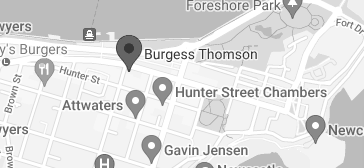Complex Estate Planning
Wills & Estate Planning
Newcastle's Legal experts in complex estate planning
Estate planning is planning for the effective distribution of your assets and affairs when you pass away. This can also involve having a back-up plan for who looks after your affairs if you lose capacity. An effective estate plan can relieve pressure from loved ones upon your death. Estate planning comprises of a range of legal documents including a Will, Superannuation Death Benefit Nomination, Power of Attorney, Enduring Guardianship and Advance Care Directive. Setting out what you wish to happen to your assets and affairs in such documents will also likely avoid estate disputes.
Complex estate planning could arise if you are part of a blended, step or joint family or if there are contingencies regarding unforeseen circumstances that you would like to account for.
With over 37 years of experience in estate planning, our team at Burgess Thomson can help you draft your Will. We can also help you plan for any future incapacity through Power of Attorney or Enduring Guardianship documents as well as any other documents which could provide further protection of your wishes. We can advise you in relation to any documents you may already have as well.
GET A QUICK QUOTE
Enter your details for an obligation free quote.
Arrange a consultation with our specialist Wills & Estates Lawyers in Newcastle.
FAQ's
Why have a Will?
Modern relationships and families can get quite complex over time. It is important that you account for the distribution of your assets and affairs before you pass away. This ensures that the people you love are not left with the responsibility of managing your affairs or potentially having to defend a claim on your estate. It avoids disputes as you will have made your wishes clear and ensures that you know what will happen when you pass away.
Who can have a valid claim on your estate?
Someone who has been a member of any blended, step or joint family you have been a part of may have a valid claim on your estate. This may include someone who you had a domestic relationship with, any children of such a relationship and extended family. Planning for such events through your Will and other related documents can protect your estate if a claim arises.
What happens if I don’t make a Will?
If you pass away without leaving a Will, your family will have to apply to Court for Letters of Administration. The Court will appoint a suitable person to act as an Administrator of your estate and decide who will inherit your assets. If there are no “eligible persons” such as children, spouses or siblings and you haven’t left a Will, upon your passing the State government will be entitled to the entirety of your estate.
What should I think about when planning my estate?
- If you have made a loan to a child or spouse on the condition that it be taken out of their share of the estate or it be paid back, you can enforce this through your Will;
- If there is someone you are leaving out of your Will who is likely to contest being left out, you can account for this in your Will and also with a Statutory Declaration outlining why you have made your decision;
- If you have any companies you are in control of that you wish to pass on, there may be additional documentation required to ensure control of these structures and assets are passed on in line with your wishes;
- Joint tenancy assets automatically pass to the other owner when you pass away. However, property owned by tenants in common (where two or more people own a property in defined shares) can be included in a Will.



